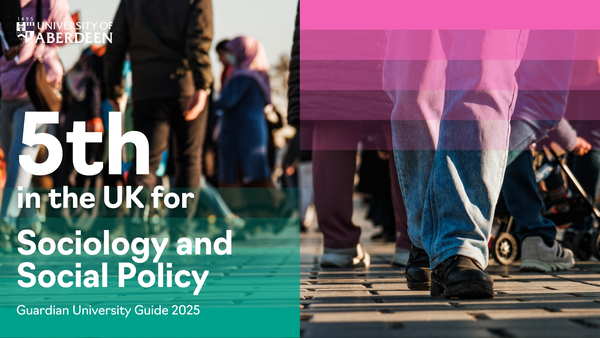Introduction
MSc Peace and Conflict Studies is designed for students wishing to develop an advanced knowledge of the intellectual terrain of conflict resolution and post-conflict peacebuilding.
This course has both January and September start dates. Apply Now
Study Information
Study Options
- Learning Mode
- On Campus Learning
- Degree Qualification
- MSc
- Duration
- 12 months or 24 months
- Study Mode
- Full Time or Part Time
- Start Month
- September or January
- Location of Study
- Aberdeen

Conflict resolution, or “peace-making,” is vital for both physical reconstruction and intergroup reconciliation, as well as for understanding and addressing the underlying causes of said conflict.
The MSc in Peace and Conflict Studies familiarises students with the dynamics of well-developed approaches to conflict resolution (or “peace-making”) and the more recent mechanisms of post-conflict peacebuilding which have developed over the past twenty years.
You will explore the processes through which state and non-state actors have attempted to define and build peace in areas affected by conflict and examine the intersection and overlap between peacebuilding theory and these processes. You will also learn to critically examine the limits to and challenges of administering mechanisms for peace, justice and development within conflict-affected societies, and the ongoing challenges for both of local ownership, evaluation, and sustainability.
This programme will provide you with an in-depth knowledge of peacebuilding theories and methods, as well as the skills necessary to pursue a career in conflict intervention and peacebuilding practice. It will also provide an essential base for those wishing to pursue PhD and related studies in Peace and Conflict Studies, conflict resolution or peacebuilding in the social sciences.
Available Programmes of Study
- MSc
-
Peace and Conflict Studies
Qualification Duration Learning Mode Study Mode Start Month LocationMSc 12 months or 24 months On Campus Learning Full Time or Part Time September MoreMSc 12 months or 24 months On Campus Learning Full Time or Part Time January Aberdeen MoreProgramme Fees
Fee information Fee category Cost EU / International students £23,000 Tuition Fees for 2025/26 Academic Year UK £11,100 Tuition Fees for 2025/26 Academic Year Graduates of the University of Aberdeen are eligible for the Alumni Postgraduate Scholarship, which reduces the tuition fee to £7,000, in line with the current tuition fee loan amount offered by the Student Awards Agency Scotland (SAAS). Please see the following for full terms and conditions: https://www.abdn.ac.uk/study/funding/653 Stage 1
PART TIME ROUTE: This programme will run over two years for those studying on a part-time basis.
- Stage 1: PD5506 and SO5529
- Stage 2: SL5011
- Stage 3: choose one from SO5512, SO5514, SO5519, or SL5512
- Stage 4: SO5919
- Stage 5: SO5015 or SO5014
Compulsory Courses
Optional Courses
Additionally, students will select one of the following:
- Dimensions of Globalization (SO5512)
- Sex, Gender, Violence: Critical Approaches (SO5519)
- Advanced Quantitative Methods in Social Science (SL5512)
Stage 2
Compulsory Courses
Stage 3
Compulsory Courses
Optional Courses
Additionally, students will select one of the following:
Programme Fees
Fee information Fee category Cost EU / International students £23,000 Tuition Fees for 2025/26 Academic Year UK £11,100 Tuition Fees for 2025/26 Academic Year Graduates of the University of Aberdeen are eligible for the Alumni Postgraduate Scholarship, which reduces the tuition fee to £7,000, in line with the current tuition fee loan amount offered by the Student Awards Agency Scotland (SAAS). Please see the following for full terms and conditions: https://www.abdn.ac.uk/study/funding/653
We will endeavour to make all course options available. However, these may be subject to change - see our Student Terms and Conditions page.
Fee Information
Additional Fee Information
- Fees for individual programmes can be viewed in the Programmes section above.
- In exceptional circumstances there may be additional fees associated with specialist courses, for example field trips. Any additional fees for a course can be found in our Catalogue of Courses.
- For more information about tuition fees for this programme, including payment plans and our refund policy, please visit our Tuition Fees page.
Scholarships
All eligible self-funded international Postgraduate Masters students starting in September 2025 will receive an £8,000 scholarship. Learn more about this Aberdeen Global Scholarship here.
To see our full range of scholarships, visit our Funding Database.
How You'll Study
Learning Methods
- Individual Projects
- Lectures
- Research
- Seminars
- Tutorials
Assessment Methods
Assessments include essays, reports, exercises and presentations. Courses are generally 100% continuous assessment.
Why Study Peace and Conflict Studies?
- Study at a nationally recognised university for sociology and policy. We are ranked 3rd in Scotland for Sociology (Complete University Guide 2025) and 5th in the UK for Sociology and Social Policy (Guardian University Guide 2025)
- The School of Social Science boasts an excellent faculty with substantial experience in training social scientists in research methods. The School’s methodological training has been recognised by the ESRC via the MSc Anthropological Research (formerly MRes Social Anthropology) and MRes Social Science programmes for many years
- The Department of Sociology at the University of Aberdeen enjoys a reputation as one of the leading centres for the study of sociology in the UK, being recognised nationally and internationally for the outstanding quality of teaching and research. In the most recent Research Excellence Framework review, the research quality of the Department was judged as 'Excellent’
- Learn from internationally recognised and widely published experts. The MSc draws on the exceptional expertise in religion, political violence, conflict and peace, social movements, identity processes, and global and political sociology within Department of Sociology at the University of Aberdeen, allowing you to gain a more comprehensive understanding of the subject
- The University is home to several research centres and institutes, including the Centre for Global Development; the Centre for Global Security and Governance; the Institute for Conflict, Transition, and Peace Research; and more
- The University is ranked 2nd in Scotland for Overall Student Satisfaction in Sociology, Social Policy and Anthropology (National Student Survey 2024)
Entry Requirements
Qualifications
The information below is provided as a guide only and does not guarantee entry to the University of Aberdeen.
Applicants for admission will normally be expected to hold a relevant Honours degree with a 2:2 standard from a recognised university or body. Applicants without this qualification may be admitted subject to having an alternative qualification, or an approved level of work experience appropriate to the field of study.
Please enter your country or territory to view relevant entry requirements.
English Language Requirements
To study for a Postgraduate Taught degree at the University of Aberdeen it is essential that you can speak, understand, read, and write English fluently. The minimum requirements for this degree are as follows:
IELTS Academic:
OVERALL - 6.5 with: Listening - 5.5; Reading - 6.0; Speaking - 5.5; Writing - 6.0
TOEFL iBT:
OVERALL - 90 with: Listening - 17; Reading - 21; Speaking - 20; Writing - 21
PTE Academic:
OVERALL - 62 with: Listening - 59; Reading - 59; Speaking - 59; Writing - 59
Cambridge English B2 First, C1 Advanced or C2 Proficiency:
OVERALL - 176 with: Listening - 162; Reading - 169; Speaking - 162; Writing - 169
Read more about specific English Language requirements here.
Document Requirements
You will be required to supply the following documentation with your application as proof you meet the entry requirements of this degree programme. If you have not yet completed your current programme of study, then you can still apply and you can provide your Degree Certificate at a later date.
- Degree Certificate
- a degree certificate showing your qualifications
- Degree Transcript
- a full transcript showing all the subjects you studied and the marks you have achieved in your degree(s) (original & official English translation)
- Personal Statement
- a detailed personal statement explaining your motivation for this particular programme
- Reference x 2
- two reference letters, one of which should be from your university discussing your academic ability. If you have been out of education for a long time you may wish to use your current or most recent employers, or other professional individuals
Aberdeen Global Scholarship
Eligible self-funded Postgraduate Taught (PGT) students will receive the Aberdeen Global Scholarship. Eligibility details and further information are available on our dedicated page.
Aberdeen Global ScholarshipCareers
This MSc programme equips you with detailed empirical knowledge and analytical skills for understanding the central concepts and processes involved in conflict resolution and post-conflict peacebuilding.
Graduates of this programme can apply their skills and knowledge to future employment in international diplomacy and civil service, as well as to careers in international institutions, research centres, charities, NGOs, think tanks, and more.
Career Opportunities
- Civil Servant
- Diplomacy, Defence, Development
- Government Officer
- International Non-Governmental Officer
- Political Analyst
- Public Advocacy
- Social Researcher
What our Alumni Say
Our Experts
- Director
- Professor Gearoid Millar
Information About Staff Changes
You will be taught by a range of experts including professors, lecturers, teaching fellows and postgraduate tutors. However, these may be subject to change - see our Student Terms and Conditions page.
Facilities
Centre for European Survey Research
The ECSR has Associate Survey Agencies in more than 100 countries worldwide and can offer basic and applied research in form of quantitative and qualitative surveys as well as other empirical research tools in the social and economic sciences.
New Europe Centre
The New Europe Centre represents a group of researchers at the University of Aberdeen with projects from a number of different funding sources. We are committed to doing quality research in order to better understand the world around us.
Centre for Global Security and Governance
The Centre for Global Security and Governance brings together academic experts, policy makers, and students to define, analyse, and propose remedies to the most pressing security and governance challenges the world faces in the 21st century.
Get in Touch
Contact Details
- Address
-
Student Recruitment & Admissions
University of Aberdeen
University Office
Regent Walk
Aberdeen
AB24 3FX


